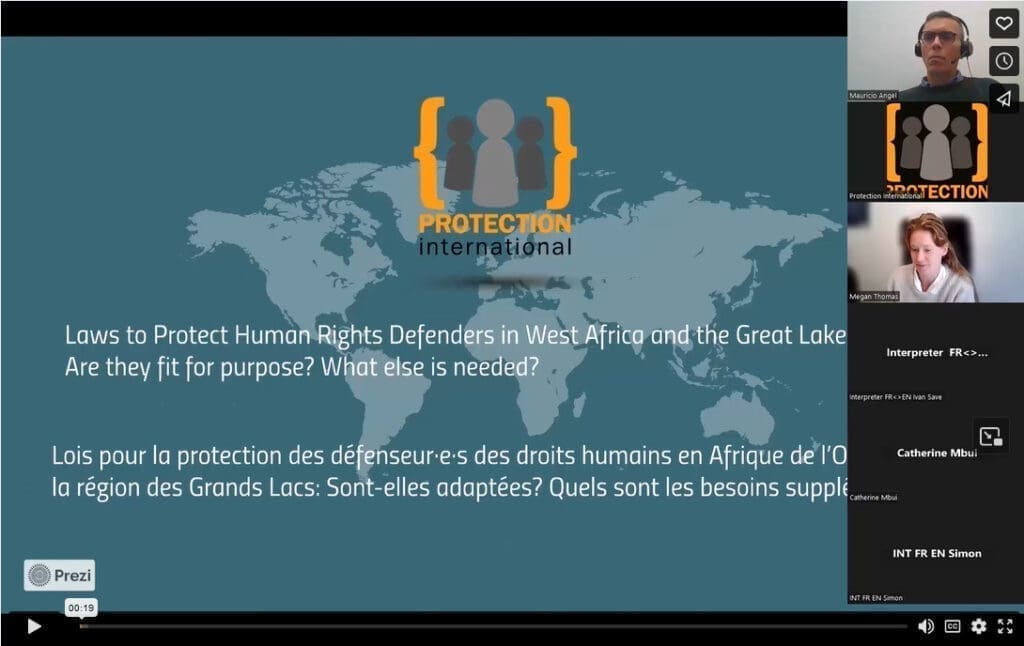On Thursday, 27 July 2023, Protection International (PI) hosted the online webinar on public policies “Laws to Protect Human Rights Defenders in West Africa and the Great Lakes Region: Are they fit for purpose? What else is needed?”
Five regional public policy experts participated as panelists, including Marthe Coulibaly, Director of the Coalition Ivoirienne des Défenseurs des Droits Humains (CIDDH), Kanni Abdoulaye, Coordinator of the Réseau Nigérien des Défenseurs des Droits Humains (RNDDH), Catherine Mbui, HRDs Focal Person at the Kenya National Commission on Human Rights (KNCHR), Stella Yanda, Executive Secretary of INITIATIVES ALPHA, and Vicar Batundi, National Coordinator of the Foyer de Développement pour l’Autopromotion des Pygmées et Indigènes Défavorisés (FDAPID).
Over 140 persons attended the webinar and participated very actively, asking numerous and engaging questions. With the help of our panelists, we were able to delve into the existing protection policies in their countries while identifying avenues for civil society action. We also discussed how state authorities and NHRIs can enable the space for a vibrant civil society to thrive across Africa.
Protection International’s work in public policies for the protection of human rights defenders
Contributing to better public policies for the protection of human rights defenders (HRDs) is at the heart of Protection International’s (PI) strategy: since the early 2000s, we have published several reports and analyses on this topic and we have supported local authorities and civil society public policy work in some countries in Africa, Latin America and Asia.
This topic is at the heart of our interventions because, ultimately, the obligation to protect defenders from threats and attacks lies on State authorities.. Moreover, adopting public policies geared at protecting defenders and their right to defend human rights can help tackle this complex problem.
Yet, national public policies to protect HRDs at risk come in many shapes and forms: it can be national laws, subnational legislation, protection mechanisms, policies and guidelines by independent NHRIs, among others. In Latin America, for instance, we see a strong focus on protection mechanisms, mainly because of the high levels of violence and criminality that affect HRDs, while in Africa there has been a proliferation of national laws, mainly in West Africa, and the subnational legislation in Democratic Republic of Congo (DRC). Such legislation, however, is more a declaration of intent by the state authorities than an effective way to protect HRDs: we have seen little to no implementation when it comes to preventing and addressing threats and aggressions.
Unfortunately, both regions share a common denominator in the implementation gap. Even though there are mechanisms and laws in place in many countries, defenders continue to be targeted and attacked with high levels of impunity.
As part of our work on this field, Protection International created the FOCUS Observatory, an online platform that aims to centralise knowledge about public policies for the protection of HRDs around the world, keep track of updates and analyse their reach and effectiveness.
More recently, PI’s office in DRC and its Global team based in Brussels embarked on a collaborative research project focusing on how HRDs perceive the impact of the protection subnational legislation (provincial edicts) of North and South Kivu on their human rights work. The results of this research will be soon published in the FOCUS Observatory website.
Main takeaways from the webinar
As main takeaways from the webinar, we could highlight the following ones:
- Closing the implementation gap and effectively protecting HRDs requires political will. Politicians and government officials must recognise the role that human rights defenders play in building a democratic and more just society.
- Adopting public policies to protect HRDs and their right to defend human rights are complex processes that depend on the socio-political and institutional realities of each country. The effort make take several years to bear its fruit – as illustrated by the case of Niger. Moreover, adopting national laws is not the end but the beginning of a journey: as the case of Côte d’Ivoire illustrates, civil society has been engaging with different state authorities with the aim to adopt additional policy instruments that allow for the proper implementation of the national law.
- Participation of civil society in the development of protection policies is essential. Policy-makers should build spaces to engage with CSOs and other stakeholders (including NHRIs) to properly discuss and include the protection needs of women defenders and HRDs from vulnerable groups, including those with disabilities. Such dialogue between HRDs and local authorities is also key to build an enabling environment for the defence of human rights.
- Networks for protection are likewise essential: protection networks at a national level should include HRDs and their CSOs at the grassroots level and across the country. These networks should be strengthened through the links with African regional networks as well as with international partners and stakeholders. The case of DRC provides an example where embassies and diplomatic missions have provided support to the efforts by the government, the parliament and civil society organisations to adopt HRD protective legislation in the country.
- Networks can also play an important role in terms of the monitoring and evaluation of HRD protection public policies. While pushing for legislation and public policies that protect HRDs and their right to defend human rights, defenders and their CSOs should keep an eye on restrictive legislation and seek to repeal or at least modify it.
The webinar was organised within the scope of two projects in the Democratic Republic of Congo and West Africa, financially supported by the German government. We also counted on the strong collaboration of our partners: Solidarité Féminine pour la Paix et le Développement Intégral (SOFEPADI), Coalition des Femmes Défenseuses des Droits Humains, West African Human Rights Defenders Network, and Partnership for Justice.


